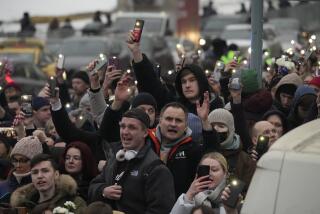Russian tycoon quits alternative party, alleges Kremlin tricks
One of Russia’s wealthiest men on Thursday abruptly quit as leader of a party casting itself as a challenger to the Kremlin’s stranglehold on politics, suggesting to supporters that a feared power broker had orchestrated a takeover because the party was becoming too independent.
The decision several months ago by Mikhail Prokhorov, a businessman who owns the New Jersey Nets basketball team, to try to revive the moribund Right Cause party had been controversial from the start.
Prokhorov has decried the lack of alternatives to the governing party. But many analysts have regarded his political move as an effort by the Kremlin to build a “puppet party” that does not threaten the political order.
The Right Cause congress this week in Moscow was supposed to approve its list of candidates for December elections to the State Duma, the parliament’s lower house. Instead, it ended with its leader resigning and urging other party members to follow him out the door.
“During this brief period I have felt what political monopoly is: When they call you every day, give some instructions, asking you to add some unknown people to the [ballot] lists,” Prokhorov said to a stunned crowd of about 200 delegates, guests and supporters.
A Right Cause faction controlled by the Kremlin faked documents for the party congress, registered false delegates and seized the party’s documents, Prokhorov said. Russian politics, he added, is orchestrated by a “puppet master.”
“He applies pressure on mass media, picks people and puts them in positions and tries to manipulate the citizens and their opinion,” he said in the dead silence. “His name is Vladislav Surkov.”
Surkov is an influential member of President Dmitry Medvedev’s staff, whom the president inherited from his mentor, Prime Minister Vladimir Putin. The advisor is widely thought to remain loyal to Putin, who gave up the presidency in 2008 because of term limits. He is expected to try to reclaim the presidency from Medvedev next year.
Many analysts believe Surkov launched the so-called Prokhorov project to add a touch of democratic pluralism to the largely predetermined parliamentary elections.
Andrei Piontkovsky, senior researcher at the Systems Analysis Institute, a Moscow-based think tank, said Prokhorov was to “play the role of a red herring in this process.”
“They were ready to make Prokhorov prime minister to put a new liberal face on Putin’s old Russia once Medvedev is gone, but Prokhorov upset their plans and broke his leash,” Piontkovsky said.
Prokhorov vowed to break the ruling party’s monopoly in the State Duma, and accused Putin and Medvedev of presiding over “a farcical parody of the Soviet Union.” He called for the release of jailed oil tycoon Mikhail Khodorkovsky, a political opponent of Putin, and didn’t conceal his own presidential ambitions.
“He began to irritate Putin with his activities and statements,” Piontkovsky said.
Alexei Pavlov, a Kremlin spokesman, declined to comment on Prokhorov’s charges. Another source on the president’s staff, who spoke on condition of anonymity, said, “Prokhorov became too unruly and broke all the agreements and his own promises, and has to blame only himself for his ouster.”
Maxim Shevchenko, a political commentator and member of the Public Chamber, a Kremlin advisory board, said Prokhorov was destroyed by his own authoritarian-style ambition. “If the Kremlin did interfere, it was only to restore the normal democratic process,” he said.
As Prokhorov was announcing his resignation, 75 renegade delegates held their own congress at another venue at which they named Andrei Dunayev, the party’s executive council chief, acting party leader until a new congress is held next week.
Prokhorov said at an impromptu news conference after his speech that he may organize a new party or movement soon.
Piontkovsky is not holding his breath.
“Prokhorov will be gone from the Russian political scene in no time and his party without him stands no chance to get into the Duma, where it is no longer needed,” he said.
More to Read
Start your day right
Sign up for Essential California for news, features and recommendations from the L.A. Times and beyond in your inbox six days a week.
You may occasionally receive promotional content from the Los Angeles Times.






